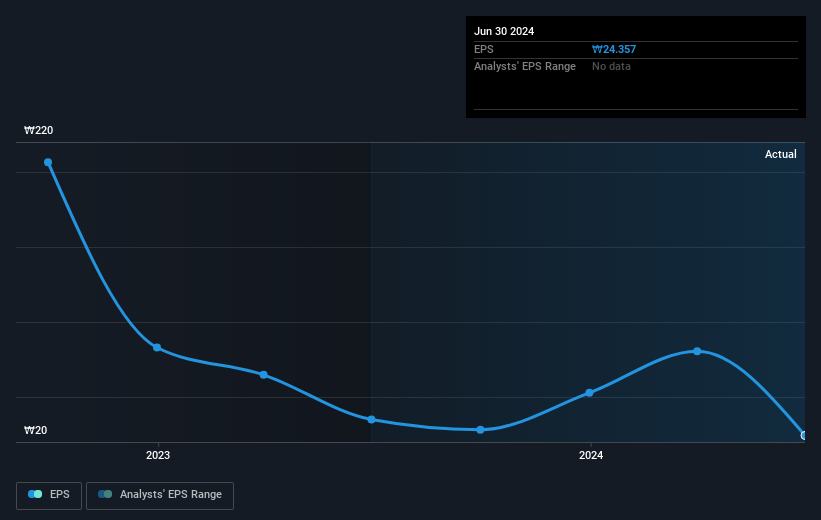- South Korea
- /
- Capital Markets
- /
- KOSDAQ:A289080
SV Investment (KOSDAQ:289080) sheds ₩11b, company earnings and investor returns have been trending downwards for past three years

If you are building a properly diversified stock portfolio, the chances are some of your picks will perform badly. But the last three years have been particularly tough on longer term SV Investment Corporation (KOSDAQ:289080) shareholders. So they might be feeling emotional about the 59% share price collapse, in that time. And more recent buyers are having a tough time too, with a drop of 26% in the last year. Shareholders have had an even rougher run lately, with the share price down 24% in the last 90 days.
Since SV Investment has shed ₩11b from its value in the past 7 days, let's see if the longer term decline has been driven by the business' economics.
Check out our latest analysis for SV Investment
In his essay The Superinvestors of Graham-and-Doddsville Warren Buffett described how share prices do not always rationally reflect the value of a business. One imperfect but simple way to consider how the market perception of a company has shifted is to compare the change in the earnings per share (EPS) with the share price movement.
During the three years that the share price fell, SV Investment's earnings per share (EPS) dropped by 51% each year. The recent extraordinary items made their mark on profits. In comparison the 26% compound annual share price decline isn't as bad as the EPS drop-off. This suggests that the market retains some optimism around long term earnings stability, despite past EPS declines. This positive sentiment is also reflected in the generous P/E ratio of 56.75.
The company's earnings per share (over time) is depicted in the image below (click to see the exact numbers).

Dive deeper into SV Investment's key metrics by checking this interactive graph of SV Investment's earnings, revenue and cash flow.
A Different Perspective
While the broader market gained around 1.5% in the last year, SV Investment shareholders lost 26% (even including dividends). However, keep in mind that even the best stocks will sometimes underperform the market over a twelve month period. Regrettably, last year's performance caps off a bad run, with the shareholders facing a total loss of 4% per year over five years. Generally speaking long term share price weakness can be a bad sign, though contrarian investors might want to research the stock in hope of a turnaround. It's always interesting to track share price performance over the longer term. But to understand SV Investment better, we need to consider many other factors. Case in point: We've spotted 4 warning signs for SV Investment you should be aware of.
If you are like me, then you will not want to miss this free list of undervalued small caps that insiders are buying.
Please note, the market returns quoted in this article reflect the market weighted average returns of stocks that currently trade on South Korean exchanges.
New: Manage All Your Stock Portfolios in One Place
We've created the ultimate portfolio companion for stock investors, and it's free.
• Connect an unlimited number of Portfolios and see your total in one currency
• Be alerted to new Warning Signs or Risks via email or mobile
• Track the Fair Value of your stocks
Have feedback on this article? Concerned about the content? Get in touch with us directly. Alternatively, email editorial-team (at) simplywallst.com.
This article by Simply Wall St is general in nature. We provide commentary based on historical data and analyst forecasts only using an unbiased methodology and our articles are not intended to be financial advice. It does not constitute a recommendation to buy or sell any stock, and does not take account of your objectives, or your financial situation. We aim to bring you long-term focused analysis driven by fundamental data. Note that our analysis may not factor in the latest price-sensitive company announcements or qualitative material. Simply Wall St has no position in any stocks mentioned.
About KOSDAQ:A289080
Low with imperfect balance sheet.


